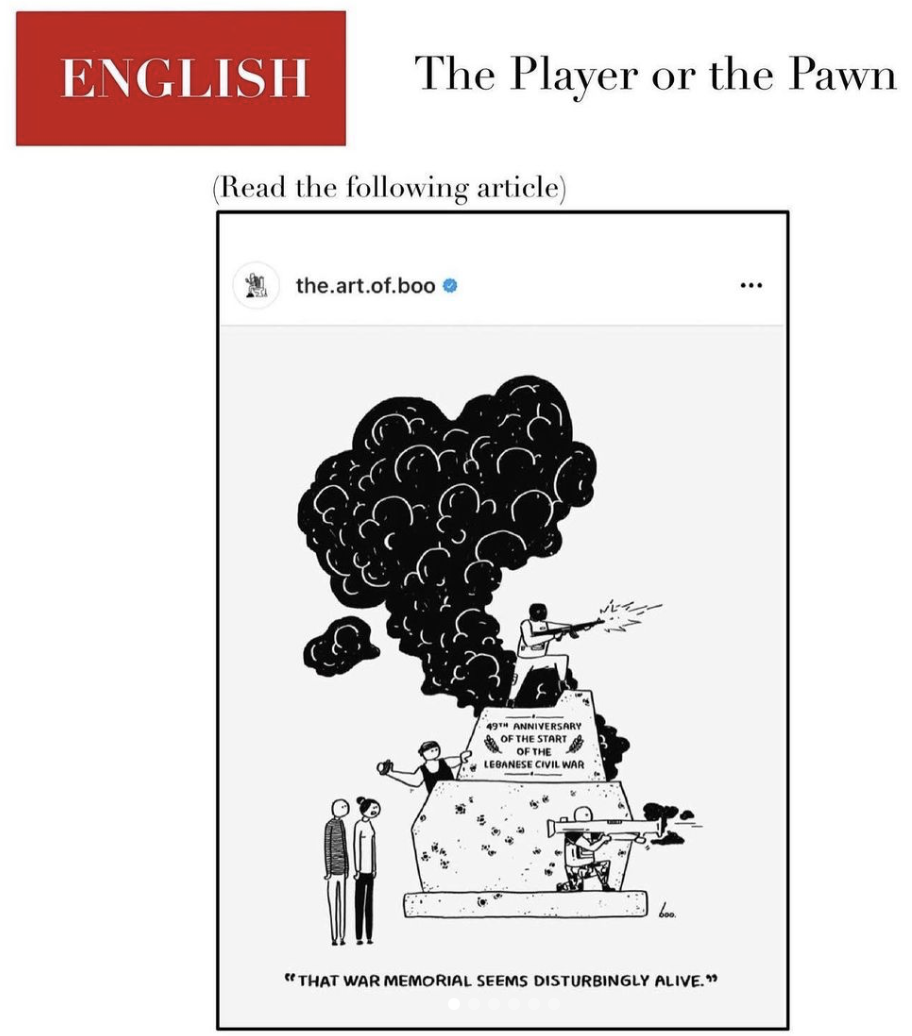April 13, 2024: 49 years since the beginning of the Lebanese Civil War. (1975-1990).
It’s ironic, isn’t it?
49 years, and where are we?
It has been indeed 49 years since the beginning of the war.
But since its end? 34 years?
Did it ever truly end?
No. Only, the situation calmed down for a while, like a halftime to gather strength.
Except that the halftime only weakened us as Lebanese, and only served to divide us.
And if the pause were to end, we would find ourselves in an even bloodier, more violent, and more deadly war.
A few days ago, talking to friends, I realized I’m afraid.
I’m afraid, because at a table, among pals, we can no longer agree.
Not even on who are the enemies of our country.
A few days ago, sitting with my parents, I was also afraid.
We summarized all the events of the past weeks. We looked at each other frightened:
‘Something serious is about to happen.’
Or rather,
‘Something serious is about to happen to us…’.
Last night, as I was getting ready to sleep, my father entered my room, alarmed:
‘Inès, come. We need to talk.’
I sat down, ready to listen.
‘Inès, they attacked.’
Like in a movie scene, West Beirut, I imagined the worst. As if I were being told:
‘Inès, the war has started again.’
I was born in 2002, in a peaceful Lebanon.
The years went by, and I grew up.
It wasn’t until 2019 that Lebanon really scared me for the first time.
And since then,
I haven’t known any respite.
Always a new problem, a new danger.
Always, this feeling that my country is drifting away.
That even with extended hands, I won’t be able to grasp onto it anymore.
2024, and I’m no longer really an activist.
Like others, I no longer know where we stand.
Only one question persists since the beginning of my page:
What does it mean to be Lebanese?
Last night, in the tumult of the evening, the habits of war returned to us.
The Lebanese left Beirut for the mountains, not forgetting to fill up the gas tank just in case.
Last night, in the tumult of the evening, Lebanese nationality and identity resurfaced.
While we were facing the risk of war, we had only one goal:
Beirut airport had just closed.
So, how would we ensure the arrival of my sister?
You see, that’s what it means to be Lebanese.
It’s the fact that leaving the country has never been the question.
It’s the fact that we didn’t want to be divided:
Some in danger, others distressed at the thought of being far from danger.
It’s the reflex to want to come together, in Lebanon.
But never to leave,
To flee.
It’s the fact that missiles and bombs don’t scare us as much as our division does.
It’s the realization that we have no role to play.
That we are eternally the victims and spectators of Lebanon’s history.
The halftime, the timeout, the restart of the game…
These are not decisions we make.
These are decisions we are victims of.
Lebanese people only have one role to play:
To shout out an opinion at a table that will never be taken into consideration.
Never, because who do you listen to at a table with 17 identities?
At a table where a single religion is not shared?
Who do you listen to when fingers are pointed at the people sitting beside you?
We are victims, obviously.
But also responsible for our own division.
Our division, a key factor in our destruction.
Like children, when the monster comes out from under the bed,
We hide under a blanket with our eyes closed, waiting for the night to end.
And if the night persists, and the monsters remain free,
The Lebanese will no longer be able to hide. New options will present themselves:
Forget about the sun and get used to the eternal night.
Or leave… temporarily.
49 years since the beginning of the Lebanese Civil War.
And 49 years after the battles, the deaths, the bloodshed, the ‘liberation’,
It may be time for the Lebanese to realize:
That he has never been the player,
Always the pawn.
– Inès Mathieu

